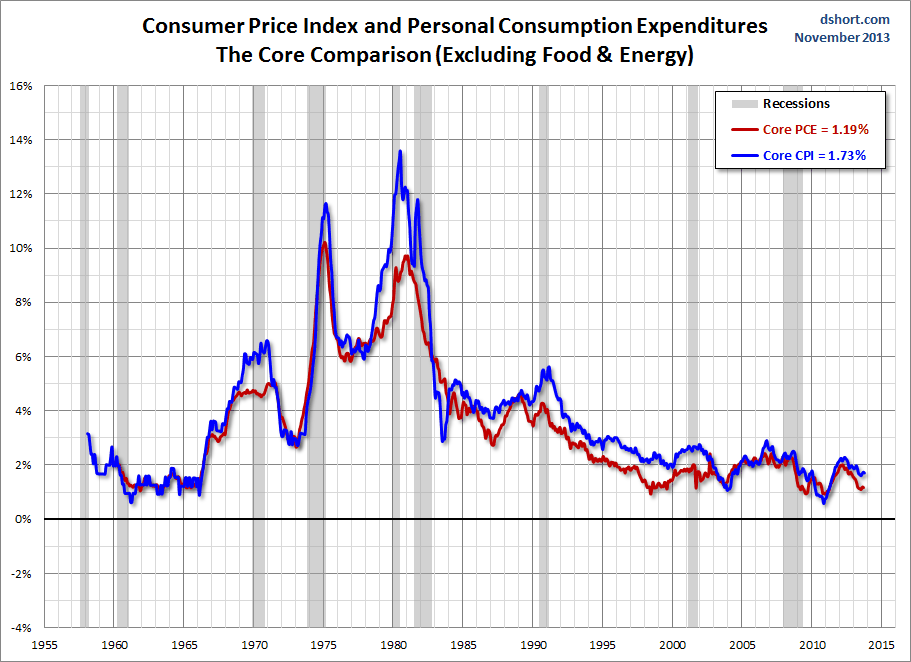I have written a variety of posts concerning deflation and "deflationary pressures" as I continue to believe that deflationary conditions are on the horizon, and that such deflationary conditions will cause, as well as accompany, inordinate economic hardship. [note: to clarify, for purposes of this discussion, when I mention "deflation" I am referring to the CPI going below zero. Also, I have been using the term "deflationary pressures" as a term to describe deflationary manifestations within an environment that is still overall inflationary but heading towards deflation.]
For reference purposes, here is a chart from Doug Short's post of November 11, 2013 titled "Two Measures of Inflation: CPI and the PCE Price Index and Fed Policy" showing long-term trends of the Core PCE and Core CPI measures:
-
As one can see in the various professional economic forecasts mentioned in this blog – as well as the continually low readings from the Federal Reserve Bank of Atlanta’s series titled “Deflation Probabilities” – economic forecasters have virtually no expectation of deflation either in the near-term or for the next few years.
However, many of the "deflationary pressures" that I have discussed in recent blog posts, such as the June 10, 2013 post titled "The Prospect Of Deflation," continue to portray a tenuous situation. As well, sundry other deflationary concerns have arisen. While my posts have focused on U.S.-based deflationary pressures, notably there also appears to be concerns over "too low" inflation elsewhere, such as that seen in the Wall Street Journal story of November 5, 2013 titled "ECB Comes Under Pressure Over Low Inflation."
Predicting the timing and extent of future deflation is challenging, for a number of reasons. One facet of this challenge is that while the U.S. has had many periods of deflation, most - with the exception of the (historically) brief episode in 2008-2009 - occurred many decades ago. As well, the frequency of deflationary periods has lessened as time has progressed. An excerpt concerning historical U.S. deflation, from the NBER Working Paper #19238, of July 2013 (© 2013 by Matthias Fleckenstein, Francis A. Longstaff, and Hanno Lustig) titled "Deflation Risk" :
We will simply observe that deflation was a relatively frequent event during the 19th Century, but has diminished in frequency since then. Bordo and Filardo (2005) report that the frequency of an annual deflation rate was 42.4 percent from 1801–1879, 23.5 percent from 1880–1913, 30.6 percent from 1914–1949, 5.0 percent from 1950–1969, and zero percent from 1970–2002. The financial crisis of 2008–2009 was accompanied by the first deflationary episode in the U.S. since 1955.
Given that deflationary episodes have been recently relatively nonexistent, "seeing" and "proving" explicit signs of such an impending condition is especially challenging.
However, I continue to believe that the continuing signs of "deflationary pressures" is a foreboding, and that actual deflationary conditions will occur after the next "financial crash." As the aforementioned NBER "Deflation Risk" paper mentions, deflation often accompanies financial-system distress. Another excerpt from the paper:
Although Atkeson and Kehoe (2004), Bordo and Filardo (2005), and others show that not all deflations have been associated with severe declines in economic output, a common thread throughout U.S. history has been that deflationary episodes are typically associated with turbulence or crisis in the financial system.
In conclusion, I continue to believe that deflationary conditions are on the horizon. As I mentioned in the aforementioned "The Prospect Of Deflation" post:
While many will undoubtedly worry about deflation when it becomes a headline topic, waiting for such a level of “certainty” will likely prove costly.
_____
The Special Note summarizes my overall thoughts about our economic situation
SPX at 1782.00 as this post is written

No comments:
Post a Comment